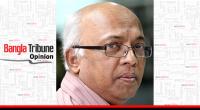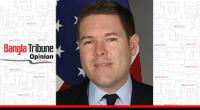 Sri Lanka has managed to survive a prolonged bloody civil war but now it finds itself in a different kind of a conflict; a political crisis of the kind that is perhaps rarely seen — Prime Minister Ranil Wickremesinghe ousted by his own President Maithripala Sirisena creating a deadlock, creating a constitutional standoff that now the world is waiting to see how it will be resolved.
Sri Lanka has managed to survive a prolonged bloody civil war but now it finds itself in a different kind of a conflict; a political crisis of the kind that is perhaps rarely seen — Prime Minister Ranil Wickremesinghe ousted by his own President Maithripala Sirisena creating a deadlock, creating a constitutional standoff that now the world is waiting to see how it will be resolved.
It certainly is something that goes against democratic norms one could argue, because this is an action that took place without prior warning. Democracy is about public processes but the removal of the Prime Minister Ranil Wickremesinghe and the appointment of his nemesis and former president Mahinda Rajapaksa took place without any warning. That is not democratic and thereafter the president prorogues Parliament where Prime Minister Rajapaksa could have tried to prove his majority. So, Sri Lanka has entered into a situation where people are talking about this in their homes, on the streets, in buses, in workplaces but the Parliamentarians can’t discuss and find a way out of the problem.
There was a lot of tension between the president and deposed PM Wickremesinghe. That tension began to manifest itself about a year ago. On a serious note, they are culturally different and have come from two different political parties. But, they did have something in common. They were not racist and therefore, not hard nationalists. They bought the hope for Sri Lanka that together they would address the issues of national reconciliation. Now sadly enough the president has gone outside the democratic process. He has shut down Parliament which should be discussing this issue and this sets a very bad precedent for transfer of power. This is the first time that a prime minster has been removed although commanding a majority in Parliament. They passed laws in Parliament. And, this is the prime minister who won in April; he won a vote of confidence from the Parliament defeating a no-confidence motion put forward by then opposition.
It remains to be seen how destabilizing this proves for Sri Lanka. For the last 30-40 years, the country has been racked by much violence. There’s been tremendous violence for example during the civil war with the LTTE, known as the Tamil Tigers, and during a number of very violent uprisings from left-wing Sinhala nationalists, lots of human rights violations; the one thing that did happen was a regular peaceful turnover of leaders through votes and through democratic and constitutionally mandated procedures. This would be the first time where someone is brought into power through a means not allowed by the Constitution. And which flies in the face of basic democratic norms. It remains to be seen if Rajapaksa’s appointment is allowed to stand. Now, there’s still some chance that either President Sirisena will come under enough pressure domestically and internationally to change his mind to reconvene Parliament quickly and allow a free and fair vote. At this point this seems unlikely. It seems the whole point of Sirisena's moves was to give Rajapaksa enough time to cajole or to possibly rope in enough lawmakers currently aligned with Wickremesinghe over to his side so that when Sirisena does finally reconvene Parliament, which is currently scheduled for Nov 16, he will have no majority.
For Rajapaksa to come in this way will produce a lot of resentment and anger among supporters of Wickremesinghe's UNP (United National Party) as well as politically aware citizens whose feel that the people in power are not there legitimately. And, that is a very dangerous thing in any country.
It’s true the government of Wickremesinghe and Sirisena together failed comprehensively across the board to really address the people’s everyday needs economically and socially and seemed out of touch. They didn’t capitalise on what little progress was made during their incumbency. They didn’t fight against the nationalist critiques of reconciliation and of accountability. They failed to really pursue, in a serious and comprehensive way, all the many allegations of corruption and political murders under the previous Rajapaksa presidency.
Economically speaking, especially, given the current global sort of economic pressures Sri Lanka is facing, a lot of people are fed up with this government, which may be a reason why there’s not more people on the street. A lot of people would be fine with this government going. But the most important point is — how all this jells with something called a democracy and respect for the rule of law.
To imagine that the government led by Prime Minister Rajapaksa would be more inclined towards reconciliation with the Tamils and the Muslims and bringing them together with the Sinhala Buddhists in Sri Lanka is really laughable. The history of Rajapaksa’s rule as president was a fairly brutal one for both Tamils and Muslims. There’s no reason to think that has changed except perhaps tactically in order to win some of their elections that are due in next year. So, perhaps one reason why a lot of people are not on the streets is because they’re afraid of Rajapaksa. There were mass level disappearances under the Rajapaksa regime earlier. People were just being picked off the street and presumably murdered for they never appeared again. There were tens of thousands of people killed illegally at the very end of the war. A repressive apparatus was set up throughout society, there was no media freedom. So, people might be a bit scared to speak out on the assumption that the same Rajapaksa will in fact be confirmed at some point soon.
Md. Sharif Hasan teaches international relations at the University of Rajshahi.
 Opinion
Opinion
30887 hour(s) 32 minute(s) ago ;
Afternoon 06:27 ; Thursday ; Apr 25, 2024
A take on the Sri Lankan political crisis
Send
Md. Sharif Hasan
Published : 16:56, Nov 05, 2018 | Updated : 19:03, Feb 06, 2019
Published : 16:56, Nov 05, 2018 | Updated : 19:03, Feb 06, 2019
0 ...0 ...
/zmi/up-hm/
Topics: Md. Sharif Hasan
***The opinions, beliefs and viewpoints expressed in this article are those of the author and do not reflect the opinions and views of Bangla Tribune.
- KOICA donates medical supplies to BSMMU
- 5 more flights to take back British nationals to London
- Covid19: Rajarbagh, Mohammadpur worst affected
- Momen joins UN solidarity song over COVID-19 combat
- Covid-19: OIC to hold special meeting
- WFP begins food distribution in Cox’s Bazar
- WFP begins food distribution in Cox’s Bazar
- 290 return home to Australia
- Third charter flight for US citizens to return home
- Dhaka proposes to postpone D8 Summit
Unauthorized use of news, image, information, etc published by Bangla Tribune is punishable by copyright law. Appropriate legal steps will be taken by the management against any person or body that infringes those laws.
Bangla Tribune is one of the most revered online newspapers in Bangladesh, due to its reputation of neutral coverage and incisive analysis.
F R Tower, 8/C Panthapath, Shukrabad, Dhaka-1207 | Phone: 58151324; 58151326, Fax: 58151329 | Mob: 01730794527, 01730794528


